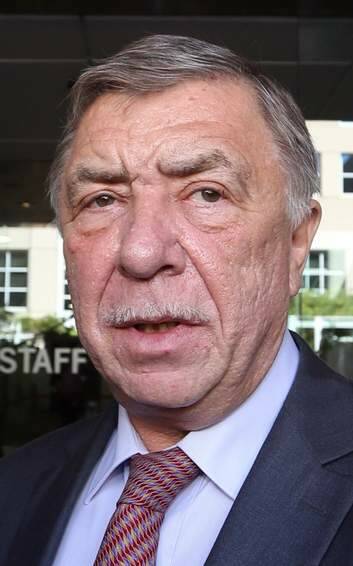The Australian government's sanctions against Russia won't affect the project most dear to the hearts of Russia's diplomats in Canberra - the construction of a luxury apartment block and new embassy building in the diplomatic enclave of Yarralumla.
Subscribe now for unlimited access.
or signup to continue reading
However, the embassy's plans to upgrade Russia's diplomatic presence may be complicated by the government's refusal to allow Russian construction workers and security experts to support the project.

Foreign Minister Julie Bishop announced on Wednesday that Australia would join the US and Europe in imposing sanctions on 12 Russian and Ukrainian people who had ''been instrumental in the Russian threat to Ukraine's sovereignty''.
The Foreign Minister said further options would be considered in response to Russia's seizure of Crimea. However, her office confirmed on Thursday the government would not block the Russian embassy's ambitious construction plans.
''Australia has not severed diplomatic relations with Russia,'' a spokesman for Ms Bishop said. ''In those circumstances, the issue of the construction of the Russian embassy does not arise.''
Russian ambassador Vladimir Morozov has lodged a development application with the ACT Planning and Land Authority (ACTPLA) for the construction of a five-storey, 18-unit apartment block inside the embassy's compound in Griffith, near Manuka's retail and restaurant precinct.
The $8.2 million project includes a large swimming pool and extensive landscaping. Embassy spokesman Alexander Odoevskiy said the new residential block was the first stage of a two-stage development that will see the embassy's chancery relocated to a new site on National Capital Authority land near the Chinese embassy in Yarralumla. The existing Griffith compound, including the planned apartment complex, will be retained as a residential precinct.
An ACTPLA spokesman said a decision on the project could be made by mid-April. ACT Minister for the Environment and Sustainable Development Simon Corbell said the embassy's development application ''will be treated the same as other development applications, unless precluded by sanctions imposed by the Commonwealth government''.
However, Mr Odoevskiy said issues relating to the construction workforce ''still need to be worked through'' as the embassy wanted to bring in workers, including ''technical and security specialists''.
He said the Department of Foreign Affairs and Trade had advised, prior to Wednesday's sanctions announcement, that this would not be permitted. According to the embassy spokesperson, Foreign Affairs and Trade officials said the Chinese embassy's controversial importation of workers to build its new high-security embassy annexe ''was a precedent that won't be followed''.
''This is a problem for us because there are many security issues in building a new embassy,'' Mr Odoevskiy said.
A DFAT spokesperson said the department “welcomes the proposed construction of the new chancery in Yarralumla for the Embassy of the Russian Federation and looks forward to the timely completion of the project.”
“The Department has had discussions with the Embassy regarding visas for the foreign personnel the Embassy may require to contribute to the project,” the spokesperson said.
“The arrangement concluded between Australia and China on the construction project in Canberra and future work on the Australian Embassy in Beijing, was exceptional.”
Russia's diplomats have long put up with dilapidated facilities after an earlier proposal to relocate the embassy was vetoed by the Fraser government after the Soviet invasion of Afghanistan in December 1979.

